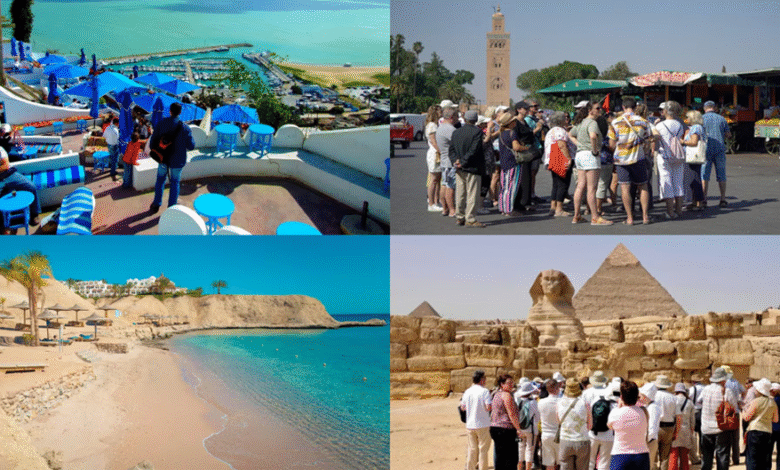Tourism : Towards a More Identity-Based and Sustainable Offering
African tourism confirms its post-Covid recovery through solid growth in arrivals and revenues. Beyond the numbers, a transformation is underway towards offerings rooted in local cultures, heritage, and sustainable development, driven by innovative private operators... By Dounia Ben Mohamed

The trend is clear: Africa is rising and reinventing itself. According to the World Tourism Organization (UNWTO), the continent recorded 74 million international arrivals in 2024, a 12% increase compared to 2023 and 7% above the 2019 level, the first pre-pandemic reference year. This momentum continued into the early months of 2025, with a 9% increase in international arrivals in the first quarter, placing total arrivals 16% above 2019 levels.
Africa is bouncing back stronger than ever, with a tourism sector that is not just recovering but redefining itself through innovation and sustainability
“Africa is bouncing back stronger than ever, with a tourism sector that is not just recovering but redefining itself through innovation and sustainability,” said Zurab Pololikashvili, Secretary-General of UNWTO. “North African countries particularly shone, registering a 22% increase in tourist flows.”
Among the key destinations, Morocco welcomed 17.4 million visitors in 2024, 20% more than in 2023, generating 104 billion dirhams in tourism revenue. Egypt, meanwhile, generated USD 10.7 billion in revenues from about 15.7 million travelers. Tanzania saw arrivals grow by 33.5% in 2024, reaching 5.36 million visitors and generating USD 3.37 billion. Kenya, with 2.39 million arrivals (+14.6%), sees tourism account for 10% of GDP and support 1.6 million jobs. South Africa confirmed its resilience with 8.92 million visitors in 2024 (+5.1%), the sector representing 8.8% of GDP and employing 1.68 million people.
Local culture and heritage are not just attractions—they are the soul of African tourism and key to delivering authentic experiences
Beyond recovery, a shift in direction is evident. Both public and private stakeholders are engaging in identity-based approaches by valuing cultural heritage, artisanal skills, and community initiatives. Morocco now offers immersive circuits in the Atlas Mountains organized with local cooperatives, while in Tanzania, community-based eco-lodges are emerging, promoting responsible tourism around safaris and conservation. Kenya, for its part, multiplies stays in cultural villages animated by artisanal and traditional activities.
“Local culture and heritage are not just attractions—they are the soul of African tourism and key to delivering authentic experiences,” says Fatma Samoura, sustainable development and culture expert.
Hotel groups are betting on strong growth in Africa, combining luxury and local authenticity
The rise of major hotel groups at the continental scale complements this transformation. Hilton plans to reach more than 160 properties in Africa by 2027, and Marriott envisions opening 50 new properties, notably in Ivory Coast, Ghana, DRC, and Madagascar. Radisson Hotel Group firmly aligns with this dynamic: with nearly 100 hotels already operational or in development across more than 30 countries, the group aims for 150 hotels in Africa by 2025, having recorded 11 signings and 7 openings in 15 months, totaling more than 2,000 signed rooms and 1,500 opened rooms. This strategy includes recent entries into markets like Tanzania, the Democratic Republic of Congo, and Cameroon, where properties such as Radisson Blu Hotel & Apartments in Yaoundé and Lubumbashi are planned for 2026-2027.
These upscale brands are nonetheless encouraged to source locally, whether for crafts, food, or materials, in line with an economic and cultural anchoring strategy. Radisson, for example, has initiated partnerships to promote local employment and community integration in its new African establishments.
Local actors and African diasporas play a key role in redefining the continent’s tourism offer
Christopher Nassetta, CEO of Hilton Hotels, emphasizes: “We believe luxury hospitality must integrate and celebrate local communities—from sourcing crafts to employing local talent—it’s about creating a true sense of belonging.”
This momentum towards more authentic and rooted tourism is particularly supported by local actors and African diasporas, who play a key role in redefining the continent’s tourism offer. These entrepreneurs, often trained abroad or inspired by their cultural roots, commit to valuing the intangible and tangible heritage of their regions. For example, in Senegal, the platform “Teranga Experience” offers stays immersing visitors in Wolof traditions, with craft workshops, local cooking, and meetings with rural communities. In Ethiopia, initiatives like “Lalibela Authentic Tours” have been launched by diaspora members to showcase historical treasures while supporting local artisans. In South Africa, the local group “Mzansi Travel” strives to create circuits focused on Zulu culture, including homestay accommodations and traditional culinary experiences. These actors, in collaboration with local authorities and NGOs, promote sustainable tourism that directly benefits populations, thereby strengthening the identity and attractiveness of African destinations on the global stage.
Amina J. Mohammed, UN Deputy Secretary-General, recalls: “Entrepreneurs from the diaspora build a bridge between global expertise and local heritage, creating tourism offerings that truly resonate with African identity.”
Preservation and sustainability at the heart of the model
At the core of their model is concern for preservation and sustainability. Rwanda embodies this innovative vision: national parks like Volcanoes, Akagera, and Nyungwe allocate a significant portion of their revenues to community, agricultural, or artisanal projects. The urban park Nyandungu Eco-Park illustrates how an ecological space can become a cultural and educational site, blending botanical gardens, an interpretation center, and community services.
Because this rapid growth also reminds us of the necessity to preserve nature. A report by the Greater Serengeti Conservation Society warns of the effects of uncontrolled tourism: the famous wildebeest migration in the Maasai Mara has dropped from 140,000 to fewer than 15,000 individuals due to fences and poorly planned infrastructure, highlighting the urgent need to balance tourism development and ecological conservation.
Kenyan conservation specialist Dr. Paula Kahumbu affirms: “Sustainable tourism is the only viable path—protecting ecosystems like the Serengeti while supporting community livelihoods is a global imperative.”
Thus, tourism in Africa is no longer simply in a recovery phase: it is being rebuilt around new values. It now seeks to combine economic performance, cultural valorization, and environmental responsibility. The continent is not merely returning to pre-pandemic visitation levels: it is building plural hospitality rooted in its identities, combining modernity and respect for its roots.






